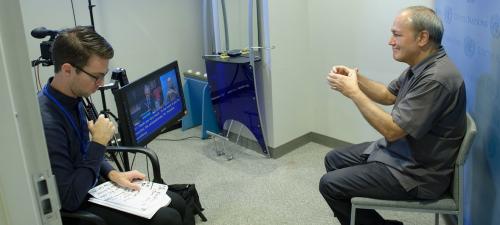Sign language protects ‘linguistic identity and cultural diversity’ of all users, says UN chief
Sign languages are crucial to “express oneself, connect with others and participate in all aspects of economic, social, cultural and political spheres”, United Nations Secretary-General António Guterres said in his message for International Day of Sign Languages, on Monday.

A sign language interpreter during the opening of the Ministerial segment of the High-Level Political Forum on Sustainable Development.
“Their use is also critical to ensuring access to information and services, including during emergencies, and to realizing the human rights of the more than 70 million deaf people around the globe”, he continued.
According to the World Federation of the Deaf, there are approximately 72 million deaf people worldwide, more than 80 per cent of whom live in developing countries. Collectively, they use more than 300 different sign languages.
Sign languages are full-fledged natural languages, structurally distinct from the spoken languages.
“Early introduction and quality inclusive education in sign language are essential for their full and effective participation, as guided by the Convention on the Rights of Persons with Disabilities”, maintained the UN chief.
There is also an international sign language, used by deaf people in international meetings as well as informally, when travelling and socializing. It is considered a “pidgin” form, that is not as complex as natural sign languages and has a limited lexicon.
“This International Day recognizes the importance of sign languages for achieving the Sustainable Development Goals and fulfilling its core promise of leaving no one behind”, underscored Mr. Guterres. “It also offers an opportunity to support and protect the linguistic identity and cultural diversity of all sign language users”.
The Convention on the Rights of Persons with Disabilities recognizes and promotes the use of sign languages, spelling out that sign languages are equal in status to spoken language. Moreover, it obligates States parties to help people to learn sign language and promote the linguistic identity of the deaf community.
The UN chief pointed out in his message that with the adoption of the UN Disability Inclusion Strategy earlier this year, the UN “established a foundation for sustainable and transformative change on disability inclusion”.
“We will lead by example”, concluded the Secretary-General. “On this International Day of Sign Languages, let us reaffirm our commitment to advancing the rights of deaf people everywhere”.
Source:UN
- 312 reads
Human Rights
Ringing FOWPAL’s Peace Bell for the World:Nobel Peace Prize Laureates’ Visions and Actions

Protecting the World’s Cultural Diversity for a Sustainable Future

The Peace Bell Resonates at the 27th Eurasian Economic Summit

Declaration of World Day of the Power of Hope Endorsed by People in 158 Nations

Puppet Show I International Friendship Day 2020

